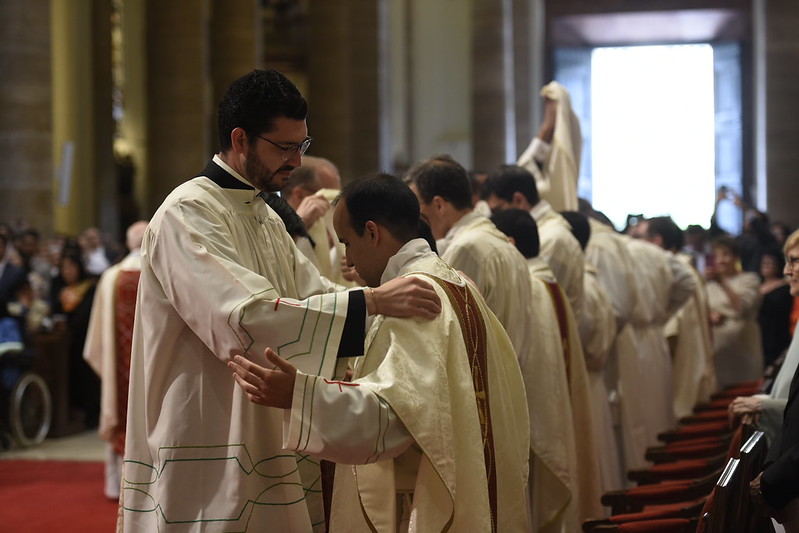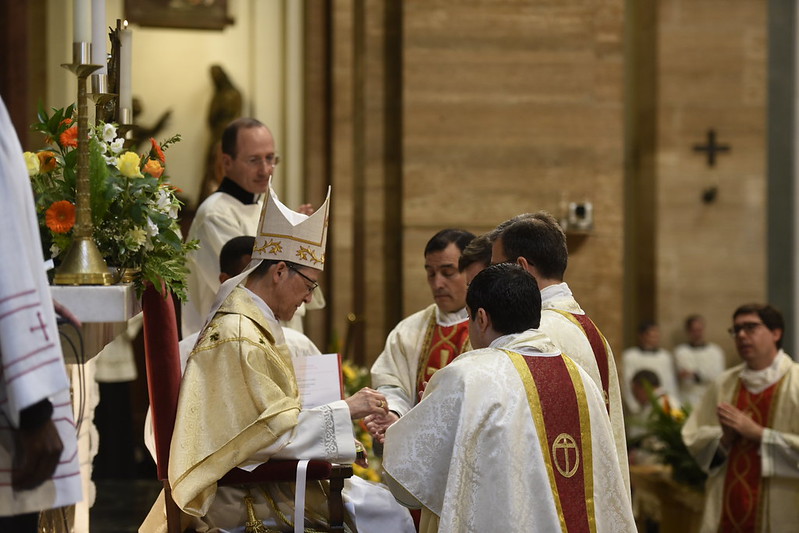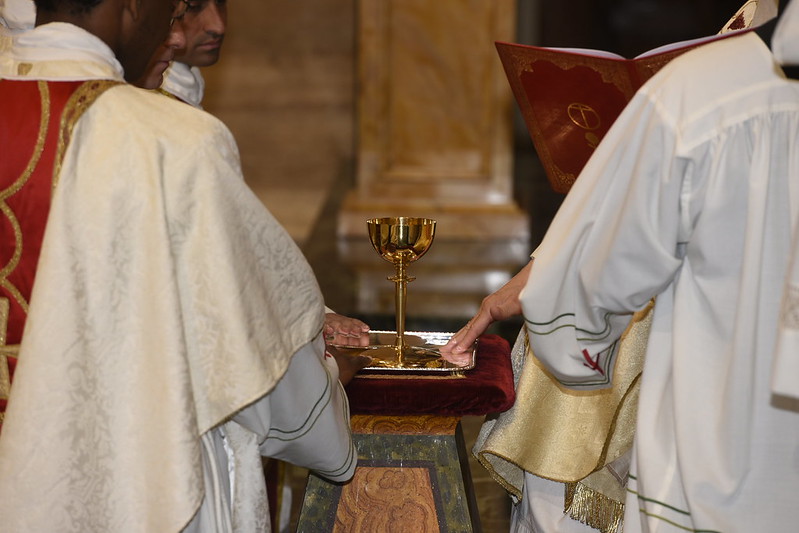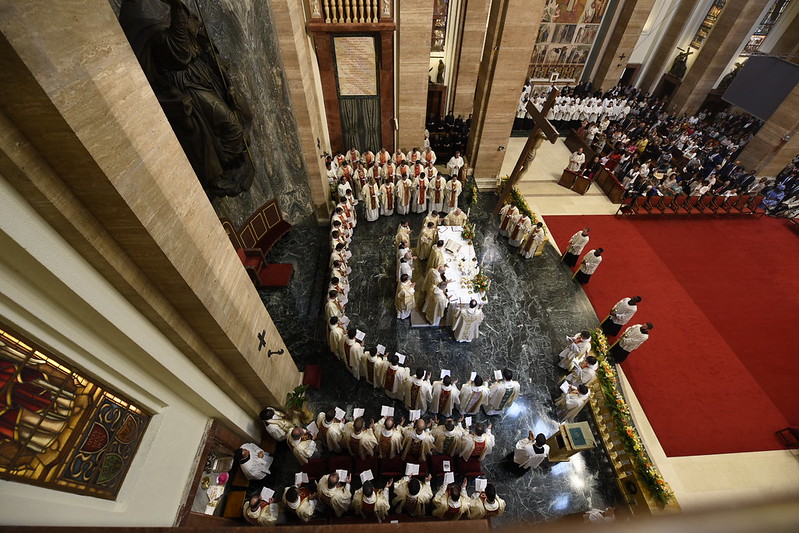(ZENIT News / Rome, 05.26.2024).- On May 25, twenty-nine faithful of Opus Dei received priestly ordination from the hands of Bishop Paul Toshihiro Sakai, auxiliary bishop of Osaka-Takamatsu (Japan). The ceremony took place in the Basilica of San Eugenio (Rome).
During the homily, Bishop Sakai reminded everyone that a priest is someone who lives for others: «Starting tomorrow, you will begin the path of becoming not what you want to be, but what those around you want you to be.»

Bishop Sakai: «Witnesses, shepherds, and sheep»
Commenting on the liturgical readings, the bishop noted that priests are called to be witnesses.
Additionally, they should no longer live for themselves, but for him who died and was raised for them (2 Cor 5:15). «The priest must be a good shepherd, like Christ, but also a good sheep, so to speak,» he said. «We priests must also listen to the voice of the Good Shepherd and follow it.»
The Japanese bishop referred to the example of the donkey, an animal the founder of Opus Dei, Saint Josemaría Escrivá, was fond of: «The donkey hears his master’s voice with his big ears.»
Before the ceremony, the bishop had given each of the new priests a small origami donkey, which he made himself, during his trip to Rome. In the homily, he shared words from Saint Josemaría’s personal notes, meant to inspire the new priests: «I am your donkey, Jesus… And from your donkey, Child God, do as you wish (…) I want to be your donkey, patient, hardworking, faithful…»
He also shared this Japanese proverb with the new priests: «The more a rice grain grows, the more it bends.» «The more experience you gain as a priest from now on,» he told the ordinands, «the more important it is to be more humble. If you are humble, you will bear more fruit.»
In his homily, Bishop Sakai asked for «for God’s richest blessings for Opus Dei, the spiritual family that has cared for these 29 people to this moment, and also for each one of you, their parents, relatives, and friends.»

The bishop encouraged the new priests to be very faithful to the spirit of the founder. He concluded by saying: «All, with the Pope, to Jesus through Mary. She invites us, as in her Annunciation, to present with humility the questions that lead to light, always concluding with the obedience of faith.»
Msgr. Fernando Ocáriz: «A great gift for you and for the whole Church»
At the end of the ceremony, the Prelate of Opus Dei, Monsignor Fernando Ocáriz, expressed his gratitude and affection for the new priests and their families: «Today you have experienced God’s closeness in a special way. The priesthood is a great gift for you and for the whole Church, and it encourages us to put into practice what Saint Josemaría recommended: to live in continual thanksgiving to God.»
He reminded the parents of the new priests: «You have contributed to the blossoming of the gift of the priestly vocation in your children. Continue accompanying them with your prayer.»
«Let us not forget to pray a lot for the Pope and his intentions today, which encompass the entire Church and the whole world; and especially now for peace.»
Priests from 19 Countries: «A gift with everyone’s help and prayer”
One of the new priests is Djuna Pascal Mansinsa, born in Kinshasa in 1988, who graduated from the University of Kinshasa in 2013 as a mechanical engineer. He worked at the Monkole hospital in equipment and facilities maintenance for three years. He arrived in Rome in 2018 to pursue a bachelor’s degree in Theology and is now finishing his thesis in biblical theology on typological exegesis in patristics.

Also receiving priestly ordination were Italians Roberto Sorrenti (Paternò, 1971) and Daniele Mottura (Milan, 1981). Daniele’s first professional experiences were in the field of green building and sustainable architecture in Milan. Roberto, on the other hand, worked in the field of professional training and contributed to the development of the Digital Engineering university program, offered through an agreement with the Polytechnic University of Milan. «The world of work is a privileged place to build long-term relationships,» Roberto says, reflecting on his future priestly ministry. «An element that keeps those relationships alive is helping others work for the common good and future generations, not just with nice words, but with concrete projects.» The two of them came to the priesthood through different paths, bringing them to Rome for the conclusion of their theological studies.
Wai Leung Ng (Billy) is another of the new priests. Born in Hong Kong in 1989, Billy studied English language and literature and education. He worked for several years as an English, ethics, and religion teacher at Tak Sun School, where (as a student of 17) he had discovered the faith and was baptized. After finishing his studies in moral theology, he is writing a thesis on «The compatibility between the concepts of natural law in Confucianism and Christianity.» «In my land, much apostolate work is needed with people of other religious traditions,» he says, so they may come to know and love Jesus Christ. “Please pray for this apostolate and for me to carry out my part as priest.”
Alberto Hikaru Shintani is from São Paulo (Brazil), where he spent his childhood. The fifth of seven siblings, his family is originally from Japan, and he returned to that country to study Japanese History at university. After completing his degree at Kobe University and later a master’s at Kyoto University, he worked as a researcher at the Japan Society for the Promotion of Science and in a Japanese NGO supporting social projects in developing countries. He was also the director of the Seido Cultural Center, a university residence of Opus Dei in Ashiya. «I learned a lot,» says Hikaru, about his future priestly ministry, «from the experience of living in both a country with Christian roots (Brazil) and another where the average young person has never had contact with the transcendent (Japan). You realize that regardless of the cultural environment, what we ultimately seek is always the same: the meaning of existence, love for life, a reason to get up every morning. I believe the figure of the priest can remind us that the answer to all these longings already exists, has a name and a face, it is Christ; and that He takes the initiative to seek us out.»

Chinwike Asolibe is Nigerian. After completing his undergraduate and postgraduate studies in Hydrogeology at the University of Benin, he spent several years teaching in schools in Warri, Lagos, and Benin City. He says that working, forming, and educating young people, helping them face the future, and making decisions with optimism has been a valuable experience. He is currently working on a doctoral thesis about the evangelization of Lagos by the Fathers of the Society of African Missions (SMA). As a priest, his desire is to dedicate himself «to ensuring that the good news planted by missionaries in West Africa over the past 150 years takes root in the lives of many people in Nigeria, so they become true bearers of the Gospel.»
Jaime Hernández is a young doctor from the United States. Born in Mexico, he specialized in Cardiology in Spain and then dedicated himself to treating cardiac arrhythmias in the United States. «I see my role as a priest as a continuation of my vocation as a doctor. Jesus was also a healer; almost all his first miracles were healings. Very often, my work as a priest will also be healing, with the Lord’s grace through the sacraments, listening, accompanying, and affectionately caring for people. I am thrilled to help renew people’s hearts so that they beat in unison with Christ’s heart. This is everyone’s deepest longing, and it is the meaning of our existence.»
Paraguayan Marcial Núñez hails from the city of Capiatá. Before embarking on his path of preparation for the priesthood, he studied electromechanical engineering at the National University of Asunción and specialized in electronics. Reflecting now on his priestly ordination, he likes to recall the words of Jesus: «You did not choose me, but I chose you and appointed you so that you might go and bear fruit—fruit that will last—and so that whatever you ask in my name the Father will give you.» He adds, «These words sum up my feelings. The call to the priesthood is a gift. We are all called by God to bear fruit wherever we are, each according to his own path. He called me to do so as a priest, with everyone’s help and prayer.»
The names and countries of the new priests are:
- Cecil Otieno Agutu (Kenya)
- Ricardo Alanís Cristóforo (Mexico)
- Chinwike Simon-Jude Asolibe (Nigeria)
- Renie Cavales Toco (Philippines)
- Gaétan Cœurderoy (France)
- Javier de Juan Pardo (Spain)
- José de la Pisa Pérez de los Cobos (Spain)
- Juan Carlos Díaz Palacio (Mexico)
- Jordi Farreras Tió (Spain)
- Matteo Frondoni (Switzerland)
- Abraham Geraldez Briones (Philippines)
- Pedro Gil Nogués (Cameroon)
- Clemens Maria Gudenus (Austria)
- Jaime Hernández Ojeda (United States)
- Juan Pablo Hinojosa Gómez (Australia)
- Javier Jauquicoa Martinena (Spain)
- Francisco Javier Jiménez Aguilar (El Salvador)
- Carlos Augusto Lisboa Santos (Brazil)
- Djuna Pascal Mansinsa Mvuala (D.R. Congo)
- José Angel Márquez Urízar (Mexico)
- José María Morales de Álava (Sweden)
- Daniele Mottura (Italy)
- Wai Leung Ng (Hong Kong)
- Marcial Eleno Núñez Álvarez (Paraguay)
- José Fernando Pérez Aguilar (Mexico)
- Álvaro Piquer Altarriba (Spain)
- Alberto Hikaru Shintani (Japan)
- Roberto Sorrenti (Italy)
- Agustín Torres Gómez (Mexico)
Thank you for reading our content. If you would like to receive ZENIT’s daily e-mail news, you can subscribe for free through this link.



